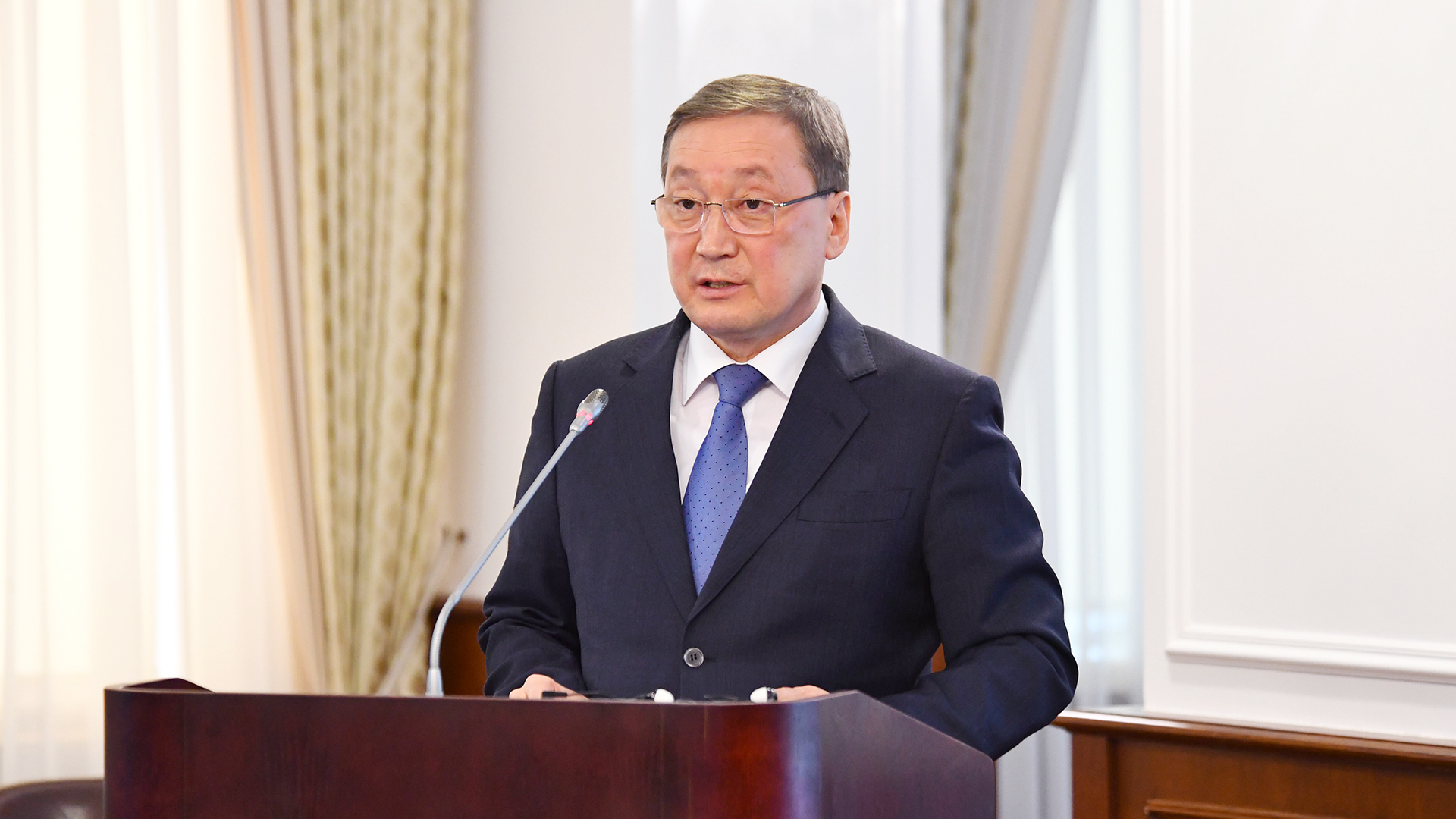17 March 2020, 11:22

At the regular Government session chaired by the Prime Minister Askar Mamin, the preparations for the spring field work were considered.
As Minister of Agriculture Saparkhan Omarov reported, in 2020 it is planned to place crops on an area of 22.5 million ha, which is 238 thousand ha more than the 2019 level. At the same time, the area of grain and leguminous crops will be 15.2 million hectares, including wheat — 11.4 million hectares.
“Pursuant to the instructions of the Head of State, work continues on diversifying the sown area and the transition to the production of highly profitable crops, so the projected area of oilseeds is 3 million hectares, which is 122 thousand hectares more than last year. The area of vegetable and melon and potato crops will increase — by 19.3 thousand ha, forage crops — by 309 thousand ha. The area of industrial crops (sugar beets, cotton, tobacco) will be 132 thousand ha,” the minister of agriculture said.
According to Omarov, the southern regions have begun sowing campaign, so in the Zhambyl region sowing was carried out on an area of 71.7 thousand hectares or 10.2% of the total sown area, 33.5 thousand hectares were sown in the Turkistan region (4.0%), Almaty region — 3.4 thousand ha (0.4%), Kyzylorda — 2 thousand ha (1.1%). Meanwhile, the minister noted that the issue of seed procurement and their quality characteristics are particularly important.
According to the operational information of the regional akimats, as of March 16, 2020, 2.5 million tons of seeds were filled up, which is 100.4% of the plan, of which seeds of grain crops — 1.9 million tons, oilseeds — 89.4 thousand tons, feed — 15.4 thousand tons, potatoes — 426.4 thousand tons.
The fields in the Aktobe region were not fully sown with grain crops, in the East Kazakhstan, Kyzylorda and Pavlodar regions — with oilseeds.
“In order to ensure equal access for farmers to high-quality seeds of both domestic and import selection, it is planned to change the subsidy mechanism. The subsidy will be available to those who purchased seeds in Kazakhstan and those who bought directly from foreign producers. The old mechanism was not provided for. There will be support for the purchase of original seeds by elitesemkhozes,” the minister emphasized.
To date, only 77.4% of the total amount of seeded seeds has been checked, 56% meet the requirements of the sowing standard, of which 38% are class 1, 10% are class 2 and 8% are class 3.
It is worth noting that, according to the results of 2019, the republic's agrarians used 470 thousand tons of mineral fertilizers. For these purposes, subsidies in the amount of 19 billion tenge were paid. At the end of last year, the fertilizer application rate was 18% of the scientific need. For 2020, 23.3 billion tenge is provided for in the local budgets of the regions, which will make it possible to purchase about 480 thousand tons of mineral fertilizers.
Regarding the use of plant protection products, it is worth noting that last year almost the entire cultivated area was covered with herbicide treatment, agricultural production and agricultural enterprises applied 13.3 million liters of herbicides in the amount of subsidies of 27.4 billion tenge.
“Starting this year, not only herbicides will be subsidized, but also other types of pesticides. For 2020, 30.8 billion tenge is provided for subsidizing pesticides in the local budgets of the regions,” Omarov informed.
As of Jan. 1, 2020, there are 143 thousand tractors, 4 thousand high-performance sowing complexes, 78 thousand seeders, 243 thousand tillage tools in the agricultural sector of the republic.
“According to the regional akimats, as of March 15, the readiness of tractors for the spring field work is 94%, of sowing complexes — 100%, of seeders — 93%, of tillage tools — 95%. By the beginning of the work, the readiness of the equipment will be 100%,” Omarov said.
In order to exclude a long stoppage of work by agricultural producers, repair teams are formed. Corresponding work was carried out with service companies to strengthen their field service, as well as filling the warehouses with the necessary spare parts.
This year, about 387 thousand tons of diesel fuel were allocated for sowing work in coordination with the Ministry of Energy for the period February-June.
“Given the difficult weather conditions, the Ministry of Energy supported our request for the allocation of 10 thousand tons of additional volume, which allowed us to fully satisfy the regional demand for diesel fuel. Currently, regional operators are conducting procedures for concluding contracts and paying for the diesel fuel allocated for the month of March,” said the minister.
To carry out activities to support the agro-industrial complex of Agrarian Credit Corporation JSC, a budget loan of 70 billion tenge was allocated from the republican budget, which is 10 billion more than usual. The interest rate for end borrowers will not exceed 5% per annum.
Lending to agricultural entities is planned to be carried out directly by the Corporation under the guarantee of second-tier banks, as well as through funding of second-tier banks, credit partnerships, regional investment centers and microfinance organizations under the guarantee of the regional investment centers for subsequent financing of agricultural entities.
Financing is planned to cover the sown area of 3 million hectares, while lending to 2,400 agricultural producers.
“At present, 1,516 applications worth 56 billion tenge have been accepted for work, 258 applications have been financed in the amount of 22.9 billion tenge covering an area of 1.4 million hectares. In general, preparations are being carried out as planned, and by the beginning of the mass spring field work, the readiness in all areas will be 100%,” Omarov assured.
According to the hydrometeorological service, the level of actual autumn moisture reserves in the upper soil layer is characterized by more than the level of 2019. The snow depth in the north of the country was 4-60 cm, in the north-west 4-36 cm, in the west 5-12 cm, in the center 6-47 cm, in the east 4-126 cm, in the mountainous regions of the southeast 1- 59 cm.
This year, spring reserves of productive moisture in a meter soil layer are expected to reach 105 mm and higher, which will favorably affect the growth and development of crops.

In turn, the Minister of Energy Nurlan Nogayev reported on the provision of fuel and lubricants. According to him, in order to conduct spring-field work in 2020, the Ministry of Energy, together with the Ministry of Agriculture, approved a schedule for assigning oblasts to oil refineries for the supply of diesel fuel for field work in 2020, within the framework of which the demand for agricultural production was approved in the amount of 386.55 thousand. tons
It should be noted that the shipment of diesel fuel from the refinery for agricultural production is carried out on a priority basis. At the same time, control and monitoring of shipments is carried out on a daily basis.
As for the price of diesel fuel for agricultural production, the recommended price of diesel fuel for spring field work in 2020 amounted to 194 thousand tenge / ton. Taking into account delivery and storage, the forecast price for agricultural production should be about 180 tenge / liter, 13 tenge cheaper than gas station prices.
“Against the background of a decrease in world quotes for energy resources, resource owners also reduced the price of diesel fuel for spring field work from 194 thousand tenge / ton to 184,000 tenge / ton. Taking into account delivery and storage, the forecast price for agricultural production should be about 172 tenge / liter, that is, 21 tenge cheaper than gas station prices. This price is recommended only for March, the subsequent price of diesel fuel for agricultural production will be calculated taking into account the current market conditions for that period,” Nogaev said.
It is worth noting that those volumes that were contracted and paid, but not shipped, will be recalculated. At the same time, this rule does not apply to volumes already shipped.
If agricultural producers in the region have offers at a price lower than recommended, then operators have every right to purchase diesel fuel outside the schedule.
Stay updated about the events of the Prime Minister and the Government of Kazakhstan - subscribe to the official Telegram channel
Subscribe